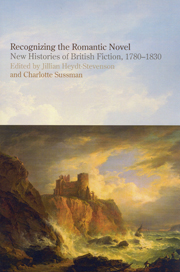Book contents
- Frontmatter
- Contents
- Acknowledgements
- Notes on Contributors
- Preface
- 1 ‘Launched Upon the Sea of Moral and Political Inquiry’: The Ethical Experiments of the Romantic Novel
- 2 Bad Marriages, Bad Novels: The ‘Philosophical Romance’
- 3 Enlightenment or Illumination: The Spectre of Conspiracy in Gothic Fictions of the 1790s
- 4 Burney's Conservatism: Masculine Value and ‘the Ingenuous Cecilia’
- 5 ‘All Agog to Find Her Out’: Compulsory Narration in The Wanderer
- 6 A Select Collection: Barbauld, Scott, and the Rise of the (Reprinted) Novel
- 7 Austen, Empire and Moral Virtue
- 8 Fanny Price's British Museum: Empire, Genre, and Memory in Mansfield Park
- 9 Between the Lines: Poetry, Persuasion, and the Feelings of the Past
- 10 Scholarly Revivals: Gothic Fiction, Secret History, and Hogg's Private Memoirs and Confessions of a Justified Sinner
- 11 Sympathy, Physiognomy, and Scottish Romantic Fiction
- Works Cited
- Index
8 - Fanny Price's British Museum: Empire, Genre, and Memory in Mansfield Park
- Frontmatter
- Contents
- Acknowledgements
- Notes on Contributors
- Preface
- 1 ‘Launched Upon the Sea of Moral and Political Inquiry’: The Ethical Experiments of the Romantic Novel
- 2 Bad Marriages, Bad Novels: The ‘Philosophical Romance’
- 3 Enlightenment or Illumination: The Spectre of Conspiracy in Gothic Fictions of the 1790s
- 4 Burney's Conservatism: Masculine Value and ‘the Ingenuous Cecilia’
- 5 ‘All Agog to Find Her Out’: Compulsory Narration in The Wanderer
- 6 A Select Collection: Barbauld, Scott, and the Rise of the (Reprinted) Novel
- 7 Austen, Empire and Moral Virtue
- 8 Fanny Price's British Museum: Empire, Genre, and Memory in Mansfield Park
- 9 Between the Lines: Poetry, Persuasion, and the Feelings of the Past
- 10 Scholarly Revivals: Gothic Fiction, Secret History, and Hogg's Private Memoirs and Confessions of a Justified Sinner
- 11 Sympathy, Physiognomy, and Scottish Romantic Fiction
- Works Cited
- Index
Summary
This essay seeks to answer two questions: how does Fanny Price, the heroine of Jane Austen's 1814 novel Mansfield Park, experience imperialism, and what might Fanny's experience, and the novel's ways of representing it, tell readers about the novel's, Austen's, or Britain's relation to empire itself? In making the question of experience and its representation the focus of this essay and the novel it discusses, I depart from the recent critical orthodoxy that has made it difficult to read Mansfield Park other than as a synecdoche for contemporary imperial history. In so doing, however, I aim not so much to reclaim the novel from postcolonial approaches as to propose methods for investigating imperial questions that take into renewed account this novel's specifically Romantic character.
Edward Said's most significant contribution to the study of Mansfield Park was the respatialization of a novel that had, as Said put it, been read as ‘constituted mainly by temporality’, and his insistence on the dynamic interconnectedness of transatlantic space. Yet in establishing Sir Thomas Bertram's Mansfield Park estate in the geographic context of colonialism and plantation slavery, Said represented his approach as supplementary, even prosthetic, in character, a matter of giving voice to what Austen's novel, like nineteenth-century Britain in general, had forgotten or failed to say about its imperial dependency.
- Type
- Chapter
- Information
- Recognizing the Romantic NovelNew Histories of British Fiction, 1780-1830, pp. 208 - 236Publisher: Liverpool University PressPrint publication year: 2010

